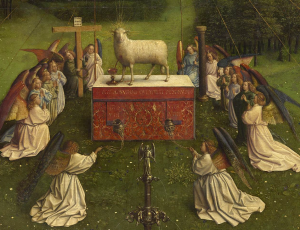Words on the Word
Maundy Thursday 2025
Exodus 12.1-14: You shall escape the destroying plague.
1 Corinthians 11.23-26: Every time you eat this bread, you proclaim the Lord’s death.
Joh n13.1-15: What I have done for you, you must do.
Flannery O’Connor is one of the twentieth century’s most consequential Catholic novelists. She was, in addition, a woman apparently unable to speak an insincere word. She once, in a letter, described an exchange she had had about the Last Supper. It took place when she, aged about 25, had been invited to a dinner party with the much more established, much grander author Mary McCarthy. 
McCarthy was regarded, and probably regarded herself, as a ‘Big Intellectual’; whereas Flannery seemed to herself ‘a dog present who had been trained to say a few words but overcome with inadequacy had forgotten them’. Dinner started at 8. Well past midnight Flannery still hadn’t opened her mouth, ‘there being nothing for me in such company to say’. When dawn approached, the conversation turned to theology. McCarthy had left the Catholic Church as a teenager. She remarked that she had used to think of the Eucharistic host as the Holy Spirit, adding, with a stab at wit, that the Spirit seemed to her ‘the most portable person of the Trinity’; now, though, she inclined to think of the host rather as a symbol, which seemed more sophisticated. At that point Flannery’s cup overflowed. She uttered those famous words: ‘Well, if it’s a symbol, to hell with it.’ I presume the party came to an abrupt end at that point.
‘That was all the defence’, Flannery confided, ‘I was capable of but I realise now that this is all I will ever be able to say about it, outside of a story, except that it is the centre of existence for me; all the rest is expendable.’
We gathered here tonight can say the same: the mystery we celebrate, the institution of the Eucharist, is the centre of our existence. It expresses our deep faith. It is the source of our hope, our courage, our vitality. To know it is so is what matters. At the same time it can be handy to try to frame in words, be it experimentally, why and how the Eucharist is so essential. What actually happens on Maundy Thursday?
It is Easter. Jesus knows that ‘his hour has come’. Violent death is imminent. He longs to give those who are his in the world a pledge of his love. This is the framework John draws: at once intimately personal and objectively theological.
What do we spontaneously do when we must take leave of someone we love? We give them something — a word, a gesture, an object — that will make it possible for us to remain with them even when we are no longer physically there.
I often think of a reportage I heard on the BBC in March 2022, more than three years ago (three years!), when Russia’s war of Ukraine had been unleashed. Soldiers were mobilised. Families were divided. Jeremy Bowen reported, audibly moved, from the railway station in Kyiv:
Fathers stood on the platforms waiting to see their families off. […] A man called Alexander sobbed as he waited for the train to leave. He’d put his wife and two small children on board. Alexander wouldn’t let go of a small toy ambulance his eight year-old son had given him as he put them on the train. He kept playing its siren. All the heartbreak of the war was on one man’s face.
We intuit what the toy represented. We think of a birthday present carefully selected, of hours spent in careless play in a confidential setting, of mutual tenderness. The son gives his father his dearest possession, a gift the father once gave him, back, to say: ‘I love you, I will stay with you and wait for you: the game awaits us.’ What a song that ambulance’s siren sang.
The Eucharist has something of this aspect. We may call it symbolic as long as we remain conscious that a symbol isn’t necessarily just a thing pointing to another thing, the way a golden ‘M’ indicates proximity of food rich in protein or cultural colonialism, depending on one’s hermeneutic. A symbol can be a bearer of content: think of a wedding ring. In the Eucharist Jesus gives us an expression of his love. That expression conveys his love effectively. We receive it and assimilate it in ourselves as nourishment; it becomes part of oss concretely, corporeally.
We must go further, though, to reach understanding. It is the Word-made-flesh who presents the bread and says: ‘This is my body given for you, do this in memory of me.’
‘The Word was in the beginning’ (John 1.1). ‘All things have been created through him and for him’ (Colossians 1.16). The Word’s words are creative, transformative.
When the Word says, ‘Let there be light!’, darkness withdraws; when he says, ‘Your sins are forgiven’, innocence is reborn; when he says, ‘Simon, you will be Peter’, a man is no longer the same; when he says to one three days dead, ‘Lazarus, come out!’, death has no chance. In the Eucharist we ‘remember’ an historical occurrence. At the same time we receive something entirely new. Our Lord makes ‘all things new’ (Revelation 21.5). That is how he is. That is how he works, first in his incarnate presence, then through his mystical body.
The Last Supper was a Paschal meal, so a memorial in itself. Partaking of the Paschal lamb Israel re-lived its liberation from limiting but safely predictable captivity into promising but uncontrollable freedom. ‘Pascha’ means ‘passing-by’. The Lord’s destroying angel ‘passed by’ the houses marked with the blood of the lamb: that is one significance of the word. In addition this motif points towards a way of living in this world, so lovely and so brittle. None of us has here an abiding city. We are pilgrims here a while, then called to pass on, to pass by.
To live well is to be serenely, trustfully ready for departure.
The Lamb who was slain was not held captive in death. The Lamb is crowned with victory now. We are called to follow wherever he  goes (Revelation 14.4). Through the Eucharist the incarnation continues in God’s holy Church.
goes (Revelation 14.4). Through the Eucharist the incarnation continues in God’s holy Church.
The Word is still made flesh; our flesh, like our minds and souls, is nurtured by the Word. Truly we touch, here, the centre of existence. May we always be gathered there, steadfastly grateful, faithfully ongoing. Amen.
